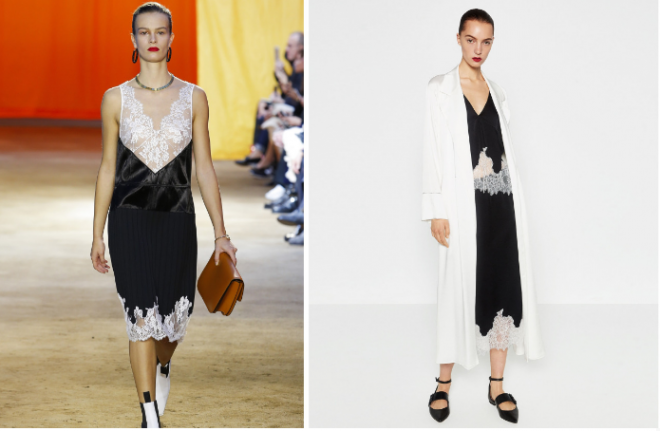This Indie Artist Is Claiming Zara Has Ripped Off Her Work. Why Does This Keep Happening?
“I plan to pursue this further, even though they are trying to belittle and bully me."

Plagiarism is an ugly business, no matter what the scale, but one of the biggest repeat offenders is the world of fast fashion — where designs are regularly ripped directly from the websites of artists or from the runways of bigger fashion labels.
This is by no means the only criticism levelled at the industry. Big brands are often accused of being ethically dubious flaming piles of garbage. They have also known to be bad for the environment and exploitative in their production. Considering all that, stealing ideas for designs and prints from struggling independent artists is less like rubbing salt in a wound and more like going for a swim in the ocean with a compound fracture.
Today, the artist who seemed to suffer that fate is LA-based designer Tuesday Bassen. Making her grievances public, Bassen has posted a series of tweets comparing her original artwork to products from Zara claiming the big fashion chain has refused to acknowledge the similarities or pay her.
Companies like @zara make it a business plan to steal designs from indie artists & condescend when you want payment. pic.twitter.com/YKG3RxShCD
— Tuesday Bassen (@tuesdaybassen) July 19, 2016
–
Here We Go Again
“I first noticed the copies in early 2016, when hundreds of fans reached out to me privately to ask if I was working with them or if they were plagiarising my work,” Bassen told Junkee today. “Since then, Zara has copied four of my designs, and their lawyers claim that my work is both ‘too simple’ to defend and that I have no basis [to complain] because I am a small artist with 90k followers on Instagram — but they are a major corporation with 90 million customers and only ‘a handful of people’ would notice that the designs are mine.
“I plan to pursue this further, even though they are trying to belittle and bully me.”
Bassen has supplied us with the statement from Zara’s representatives which reads: “The lack of distinctiveness of your client’s purported designs makes it very hard to see how a significant portion of the population anywhere in the world would associate the signs with Tuesday Bassen.”
Companies like @zara make it a business plan to steal designs from indie artists & condescend when you want payment. pic.twitter.com/YKG3RxShCD
— Tuesday Bassen (@tuesdaybassen) July 19, 2016
Zara is no stranger to controversy like this. In 2012, New York street artist Patrick Waldo claimed his designs were being used on a Zara t-shirt. In 2013 it was pointed out that some of Zara’s clothes looked uncomfortably similar to releases from high-end fashion retailer Celine. In the same year, designer Tom Ford expressed his anger about what he described as Zara’s tendency to replicate catwalk looks for their own stores.
Once you start digging just a little bit, the accusations of copying come in quick and fast — and it isn’t just Zara doing it.
hey @ZARA, i moustache you a question. did you think i wouldn't notice that you stole my work? pic.twitter.com/wvfnSii5
— Patrick Waldo (@MoustacheManNYC) September 4, 2012
–
Is Everyone A Copycat?
In 2012, American artist Tori LaConsay accused H&M of stealing one of her designs prompting a storm of public outrage towards the store which, after an initial denial, issued an apology of sorts and said they were now in touch with the artist. In 2015, Target were called out for copying children’s designs directly from a small Melbourne company called Peaches and Keen — they later offered the pair $5,000.
These are just some of the most prominent examples. It seems that the (hopefully) unspoken widespread policy is to copy, hope you get away with it, and if you get called out, just cross that bridge when you come to it.
It’s easy to look at a case like Tuesday Bassen’s and unequivocally say that is wrong — it is. But then we get into the territory of designer knock-offs. Of clothes cloning. It’s all a spectrum of the same thing; people are just more willing to accept it at the higher end because it feels like the financial punch won’t be felt as hard by Dior as it would by an artist scratching by on website sales.
Scrolling through websites like Fashion Copycats — who declare that “the aim of this site is not to judge and condemn” — shows just how endemic this copying is. But, if we accept stealing designs at the higher end of the spectrum, are we tacitly approving the same on the smaller end?

Celine v Zara (via Fashion Copycats)
Plagiarism isn’t a victimless crime. “It has an awful impact on the livelihood of an artist — this is how I support myself, and they are diluting my brand by literally stealing from me,” Bassen tells us.
When asked about what she hopes will come from calling them out publicly, she replies: “I hope that one outcome is that I can raise awareness for how often this happens and how few artists can actually afford to pursue it. I would also like to be compensated for my work.”
–
Zara are yet to publicly respond to Bassen’s claims. You can check out more of her work here.